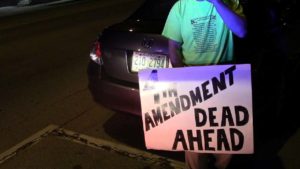 DUI checkpoints in fact are a violation of the 4th Amendment to the United States Constitution which protects us from unwarranted or arbitrary searches and seizures. The US Supreme Court acknowledged as much in Michigan Dept. of State Police v. Sitz (1990). However, Chief Justice Rehnquist, writing for the majority, argued that the state interest in reducing the number of impaired drivers outweighed the infringement, and that Sobriety Checkpoints were in fact effective and necessary. They are legal in Florida by statute (483) but 12 states have made these checkpoints illegal in spite of the US Supreme Court decision. Just like Miranda warnings and DUI arrests, this is a gray area of the law and may be a point of law that works in a defendant’s favor.
DUI checkpoints in fact are a violation of the 4th Amendment to the United States Constitution which protects us from unwarranted or arbitrary searches and seizures. The US Supreme Court acknowledged as much in Michigan Dept. of State Police v. Sitz (1990). However, Chief Justice Rehnquist, writing for the majority, argued that the state interest in reducing the number of impaired drivers outweighed the infringement, and that Sobriety Checkpoints were in fact effective and necessary. They are legal in Florida by statute (483) but 12 states have made these checkpoints illegal in spite of the US Supreme Court decision. Just like Miranda warnings and DUI arrests, this is a gray area of the law and may be a point of law that works in a defendant’s favor.
Because of the controversy concerning the 4th Amendment, DUI checkpoints have to be administered under strict procedures so that a driver’s constitutional rights are not violated. These procedures were not created by the Supreme Court but by the National Highway Traffic Safety Administration. Here are some of their guidelines for states to follow in creating DUI checkpoints:
- The DUI Roadblocks / Sobriety Checkpoints must be part of a continuous program whose principal purpose is to deter driving under the influence
- The local judicial system should be in support of the method
- Before the Roadblock / Checkpoint event, proper procedures must be established for how it will be executed
- If the Roadblock / Checkpoint time, location, or process and procedures are altered, they should be well documented
- The Roadblocks should be strategically selected for reasons of public safety, and for a specific goal – such as reducing DUI accidents in a particular high volume area
- Advance warnings should be given to drivers that a Roadblock will occur
- Demarcations of the Roadblock / Checkpoint should be obvious to alert drivers that they approaching a Checkpoint
- Law Enforcement should make their presence clearly known
- Drivers suspected and arrested for Driving Under the Influence should be taken for DUI chemical testing within a reasonable amount of time
- The Roadblock / Checkpoint must not interfere with the flow of traffic
- The Roadblock / Checkpoint should not distract other drivers
- The Roadblock / Checkpoint must be arranged such that drivers may avoid the Checkpoint
- Properly trained law enforcement officers must perform all DUI investigations
- The process and procedure that law enforcement plan to use at the Roadblock / Checkpoint for DUI investigations must be established in advance
- The process and procedure must be uniformly applied
- Drivers stopped at the Roadblock / Checkpoint should be asked for feedback
Additionally, police officers can’t randomly select drivers drivers to be checked based on age, race, or ethnicity. They may create procedures by which they stop, for example, every 5th vehicle.
If you’ve been charged with DUI during a checkpoint investigation, it’s imperative to speak with a Florida DUI lawyer immediately to ensure your constitutional rights have not been violated. If it can be proved that law enforcement did not appropriately follow the specific guidelines in place, a Motion to Suppress can be filed, and if granted can eliminate any evidence obtained at the DUI Roadblock / Sobriety Checkpoint, often resulting in a dismissal of the case.
